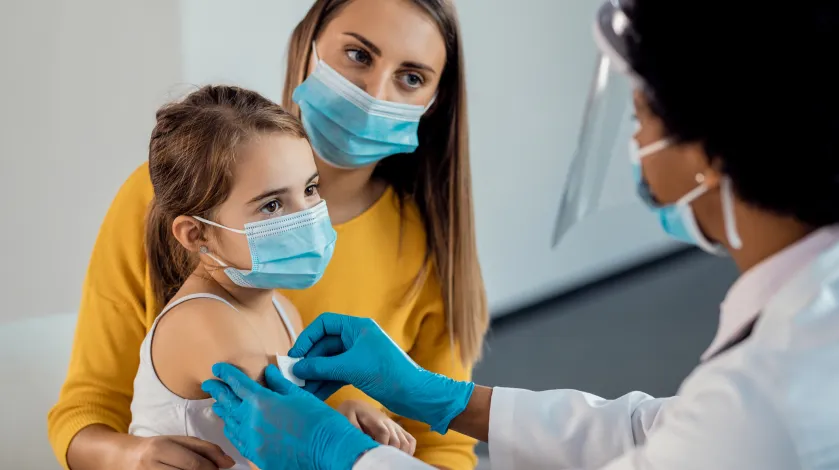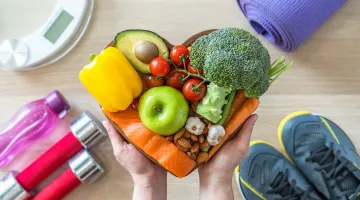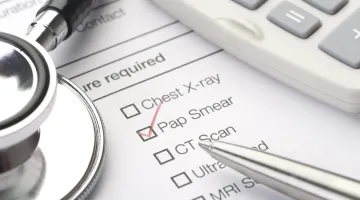COVID-19 Vaccine for Children & Teens: Your Questions, Answered
Author

Jeremy Warhaftig, MD, Pediatrician
As the rollout of the COVID-19 vaccine continues in the United States, vaccination is now an option for younger patients.
Currently, the Pfizer-BioNTech COVID-19 vaccine is available to patients as young as 12 years old.
Additionally, Moderna is seeking an expansion of its FDA Emergency Use Authorization that would allow it to distribute its vaccine to children age 12 years old and older as well.
As a result, children between the ages of 12 and 17 years old now find themselves able to receive a COVID-19 vaccine – as you can guess, this had led to lots of questions from parents.
In late May, my colleague, Charles Polcari, MD, and I hosted a virtual Q-&-A on all things COVID-19 vaccine.
We received some great questions from the audience, which we summarized below.
COVID-19 doesn’t seem to affect kids as much as adults – they don’t get as sick, and are less likely to die. Knowing this, why should my kids get vaccinated?
This is a common question, and one that many parents point to as a reason to skip out on the vaccine.
While COVID-19 causes more severe illness in adults, children still do get sick.
Some children will get sick enough to be hospitalized or end up in the ICU. More than 300 children have died of COVID-19 in the U.S. since the start of the pandemic.
Additionally, COVID-19 infection can have long-term impacts on a child’s health.
For example, in some cases, we’ve seen children and teens who had mild cases of COVID-19 develop heart conditions after infection – conditions that can keep them from playing the sports they love.
As I see it, taking proactive steps to prevent a child from getting sick, developing lifelong complications, or dying from COVID-19 is worth it – and that’s what the vaccine does.
Should we be worried about the long-term effects of these vaccines because they were developed so quickly and are still so new?
The COVID-19 vaccines currently approved for emergency use in the United States were developed in record time, a true testament to the collaborative work of the government, scientists, and pharmaceutical companies.
However, it’s important to draw this distinction: “fast” doesn’t mean “rushed.”
Many people point to the quick timeline as a reason to be suspicious, saying that anything developed that quickly can’t be sound. After all, other vaccines and medications take years to come to market.
But other vaccines and medications weren’t developed in the middle of a pandemic: with the COVID-19 vaccine, we had mountains of data due to millions of infections.
We also had more than 150,000 people participate in the vaccine clinical trials; their participation was essential.
Also, the vaccine development process received an incredible influx of financial resources, which made things run more smoothly.
Finally, the messenger RNA (mRNA) technology used in the Pfizer-BioNTech and Moderna vaccines isn’t new – it’s been around for years, and has been studied with flu, Zika, and other illnesses. mRNA technology has also been used for targeted cancer treatments.
All of those factors came together to give the science community the technology, resources, and manufacturing capabilities to get these vaccines together in record time.
My 12-year-old daughter is on the lower end of the percentile for weight range for her age – should she wait to get the vaccine?
With most childhood vaccines, weight doesn’t play much of a role in distribution guidelines. Instead, the guidelines are based on a child’s age.
The COVID-19 vaccine is no different — the vaccine is being authorized for distribution to children based on how old they are, not on weight, height, or any other physical criteria.
Unless your daughter is underweight to the point of it causing health concerns, she should have no issues getting the vaccine.
What do we know about the potential effects of the vaccine on a child’s reproductive system and hormone development?
During the clinical trials, researchers found no evidence of the COVID-19 vaccine affecting puberty, the reproductive system, or a child’s hormone development.
Additionally, based on what we know about how the mRNA technology used in the Pfizer-BioNTech vaccine works, there’s no medically plausible reason to suspect that the vaccine will have any impact on the body’s natural development.
My daughter is due for her HPV vaccine, but I’m nervous to have her receive both vaccines in the same year. Is it OK for her to get both vaccines within a few months of each other?
Yes, it’s OK for children and teens to continue to get their regularly scheduled vaccines along with the COVID-19 vaccine.
This one is likely to cause some confusion for parents, as the CDC actually changed its guidance.
Initially, the CDC said young people should get the COVID-19 vaccine on its own, meaning they shouldn’t get any other vaccines for 14 days before and 14 days after each COVID-19 vaccine shot.
However, after reviewing the safety data, the CDC changed its course, eliminating that two-week buffer.
The American Academy of Pediatrics also endorses the idea of getting the COVID-19 vaccine in conjunction with other child and teen vaccines.
What should I do if I get to a playground with my four-year-old child and the other children aren’t wearing masks?
This is a tough situation, and the right answer is going to vary from family to family.
Studies have found that being outdoors reduces the risk of COVID-19 transmission, meaning an outdoor playground is a relatively safe place to be.
It might make you feel better if all of the other kids were wearing masks, but there’s no way to control that.
Instead, think about your own situation: are you fully vaccinated? What about the rest of your family? What are the COVID rates in your community?
If your family is fully vaccinated, it’s pretty safe to allow your child to play at the playground with unmasked children (especially if your child is wearing his or her mask).
If your family isn’t vaccinated yet, if any of your family members are part of a vulnerable population, or if COVID infection rates are elevated in your area, it may be best to save the playground for another day.
Are there any concerns with reactions to the vaccine in children who have had a prior anaphylactic reaction to food?
There should be no concerns about children who have food allergies receiving a COVID-19 vaccine.
The vaccines do not contain eggs or any other food by-products, meaning food allergies shouldn’t come into play when receiving the shot.
If your child had an allergic reaction to a previous vaccine, you should talk to your child’s pediatrician before he or she receives the COVID-19 vaccine.
However, if your child’s allergies are related to things like food or pet hair, they shouldn’t prevent your child from getting the COVID-19 vaccine.
Is there a risk for children with Autism or ADHD to have increased side effects from the vaccine?
There haven’t been specific studies done to gauge the impact of side effects on children or teens with Autism or ADHD, but there’s no medical reason to suspect that the vaccine side effects will be worse for young people with Autism or ADHD.
The vaccine can cause side effects that could have your child feeling ill, including fever, pain at the injection site, headache, fatigue, or chills.
If a child or teen has behavioral or emotional challenges, feeling sick from the vaccine may make those challenges harder to handle, which parents should be prepared for.
However, there’s no reason to suspect that Autism or ADHD will make side effects worse in any way.
As things return to “normal,” how do we handle having a toddler who is not vaccinated and a family member who refuses to get the vaccine?
Like the playground question, this one will vary depending on your family situation.
However, in these cases, it’s probably best to keep any gatherings outdoors and to continue to wear a mask around your unvaccinated family member.
What are your recommendations for kids who are too young to get vaccinated still? Is it safe for them to sleep over vaccinated grandparents’ house?
Many families now find themselves in this tricky spot: most of their family members have been vaccinated, but their youngest children still aren’t eligible to receive the vaccine.
However, when it comes to things like visiting grandparents, aunts, or uncles, there’s no reason you can’t resume those visits or sleepovers – provided that the adults are fully vaccinated.
Reconnecting with loved ones in person is one of the things we’ve all been looking forward to since the pandemic began, and the vaccines have made it possible to do so safely.
Are there any medications that kids take that we should be concerned with that may affect them getting the vaccine?
At this time, we don’t know of any medications that could have negative interactions with the COVID-19 vaccines.
People with a variety of medical conditions and on a variety of medications were included in clinical trials, and no clear links were determined.
The fact that your child takes a certain medication doesn’t mean he or she shouldn’t receive the vaccine; however, if you have a question about a specific drug, it’s best to consult your pediatrician.
Is this affecting tweens getting their period by either delaying it if they haven’t gotten it or changing it if they’ve gotten it already?
As mentioned above, from a biological perspective, there’s nothing about this vaccine that will cause hormonal or reproductive changes to the body – that’s simply not how this vaccine works.
If your child or tween hasn’t had a period yet, the vaccine won’t have any impact on that period eventually coming.
There have been reports of delayed periods after receiving the COVID-19 vaccine, and researchers are still working to determine if there’s a proven link.
However, such delays would actually make sense. Periods can be delayed or irregular when you’re sick with a fever, for example, and fever is a possible side effect of the COVID-19 vaccine.
Your body’s natural immune response is what leads to the delayed or irregular period, but these changes are temporary.
We do know that these vaccines do not cause reproductive harm and do not impact fertility.
I am due in 10 days with a newborn and one set of grandparents refuses to vaccinate. Is it safe for them to meet the baby?
This is tough! I don’t like to advocate against grandparents meeting their grandchildren, but this situation obviously comes with an elevated risk.
My recommendation would be yes, with some caveats. I’d recommend that any meeting takes place outdoors, and that both grandparents wear masks for the duration of the visit.
I’d also recommend that the visit doesn’t include as much snuggling, kissing, etc. as it might during normal times.
Additionally, it might be worth it to ask your grandparents to get a test prior to meeting the baby – rapid tests that get results in just 15 minutes are much more common now, and would help with your peace of mind.
If kids had COVID-19, is there lasting immunity? Do they still need the vaccine?
The jury is still out on this one, as studies and research continue.
We do think that patients who had COVID-19 will carry antibodies with them after they’ve recovered.
What we don’t know (and won’t for a while) is how long those antibodies last and what level of protection they provide against reinfection.
Basically, we don’t know that a child who had COVID-19 is now immune to COVID-19; for that reason alone, vaccination is still recommended.
Additionally, evidence is emerging to strongly suggest that vaccines provide better and more durable protection against COVID-19, especially against the COVID-19 variants that are currently circulating around the world.
Get the latest information on COVID-19 vaccine appointments at South Shore Health.
Jeremy Warhaftig, MD is Chief of Pediatrics at South Shore Medical Center. Charles Polcari, MD contributed to this post.
Author

Jeremy Warhaftig, MD, Pediatrician







